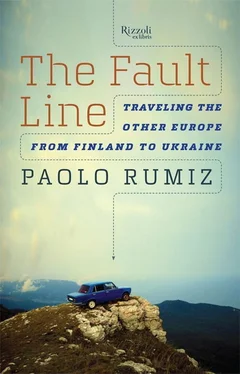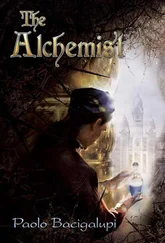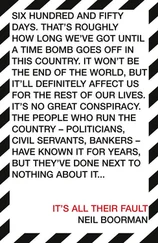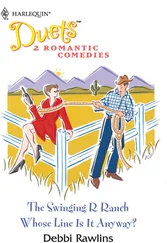The station in Uzhgorod is a little jewel with a mausoleum inside in commemoration of a famous assassination victim: Georgyi Kirpa, a former Ukrainian minister, done in, they say, by pro-Russian militants. In the middle of the waiting room, there is a case with his clothes and some tablets with the story of his martyrdom. The hostility toward Moscow is palpable. At ticket window number five, a shrew refuses to respond in the language that I’ve been using now for a month without any problems, even in the Baltic republics. Her nationalism immediately sends blood rushing to my head, because it demonizes the people rather than the criminals who govern them. I send her to hell in Italian and change to window number three, where my vendetta is promptly served up. Two Slovaks, despite knowing how to speak Ukrainian, speak English with the woman behind the glass just to highlight their membership in the club of the rich. She doesn’t understand, but they keep it up, refusing to make themselves understood even though they understand perfectly.
I look for a good hotel. I’m sick of scalding-hot rooms with saunas and discotheques on the floor below, and I find right away that in Uzhgorod everything works. The roads of five nations converge here; there is no lack of business and money. The English language shows up again at the hotel, lobster and Caesar salad on the menu, as well as, naturally, air-conditioning. But superimposed on the slipshod Soviet construction is the costly and marbled nullity of capitalism. And while all of a sudden everything works, just as suddenly there are no stories to tell. The West is the place where the yawn reigns supreme. The equation constructed by my friend Jacek in Warsaw is confirmed: “Difficulty equals story.”
Luckily, there are the Pannonian mosquitoes. The meanest, sliest, most ferocious, and hardest to snag of my entire life. Lying in wait behind the minifridge, hidden in the folds of the drapes, dug in like Vietcong in the darkest corners of the bathroom, they emerge one by one in the middle of the night to prevent us from sleeping and provide us at last with something to recount. I’m too tired for big-game hunting, and I take cover under the sheet. In the darkness, I’m reminded that one day on a comfy and punctual Swiss train, a woman said to me—I swear—that she loved Italian trains because they didn’t work and therefore, “there was at least something to talk about.” Obviously she was a snob and regarded these little inconveniences as the only surprises capable of interrupting her incommensurate boredom.
The next day. New train, to Chop, on the border with Slovakia and Hungary. The idea is to go up the Tibiscus to its source back in the Carpathians, not far from the stomping grounds of Count Dracula. My map indicates a line that goes up the entire valley and then runs down toward the Dniester near the city of Chernivtsi, from where I’ll leave to go down to Odessa. We are traveling full of hope through the desolate flatlands of Pannonia. And Chop isn’t a city; it’s a gigantic terminal full of fog, high-tension electric towers, gas pipelines, networks of tracks, immobile freight trains shiny with rain; and further still, ramps, warehouses, luggage trolleys in the scrub under a forest of electric wires. Long fields, typically Hungarian, on triennial rotation. The banks of the Tibiscus are no more than two or three hundred yards away, covered with tall yellow flowers. On board, the dark faces of Gypsies.
We bend toward the east to outline Romania. The sun comes out; vine-covered hills appear; the Tibiscus River valley begins, and the most legendary of the Danube’s tributaries appears, solitary and wild, under the southern slope of the Carpathians. Meanwhile, I discover that the train has no toilets. “It’s logical,” the ticket checker explains, “it’s a train for people who get on and off for short rides, like a bus.” At Khust, we discover that the train ends there, because the old Austrian line goes only about thirty miles on the Romanian side of the river. The fragmentation of the old Soviet world and then the wall of fortress Europe have destroyed most of the old transnational connections. Nobody will ever persuade me to abandon the conviction that Europe was more European a century ago, when my grandmother traveled by train in one day from Trieste to Transylvania.
In Khust there’s nothing that can’t be bought and sold. The main square is a little bazaar. To continue on our way, we can choose a bus or a car with a driver, which comes at a more reasonable rate than in Belarus—€80 ($110) as far as Rakhiv, sixty miles. Our driver for the trip is Mikhail, a former building engineer with years of emigration behind him. He sings as he drives, loves his country, and has no intention of emigrating. He drives us through a magnificent valley dotted with the houses of emigrants who have prospered, but their houses are nightmare concoctions: medieval-style castles with towers topped with blue plastic roof tiles. The aesthetic model of independent Ukraine is Disneyland.
Moscow may be even farther away than it was, and at ticket windows, they may speak only Ukrainian, but nevertheless the centuries-old knowledge of building materials has been lost and the identity of place along with it.
Unreachable on the opposite shore, the Romanian side, is the much more authentic beauty of Maramureş, which I saw years ago, with its wooden churches and its cemeteries adorned with paintings of laughing angels. Beyond the river and the trees, I see the bell tower of Săpânța, one of the jewels of old Europe. It would be magnificent to go over there, but it’s not possible. The border crossing at Teresva has been closed for two years. But it’s all show—“ reklama [advertisement],” Mikhail says more precisely—because here, too, smugglers come and go as they please. “Plus, for three thousand euros (five thousand dollars) you can buy a Schengen visa with no problems.” I take a good look at the river. Swimming across it would be a joke. I don’t understand. Why is there an eighteen-mile “cordon” on the border with Poland, and here there’s nothing? What a put-on, this frontier. Mikhail confirms that during the Cold War, it was worse. No sense of Communist brotherhood; if you swam across, Ceauşescu’s Romanians filled you with lead. We turn north. Now both banks are in Ukraine.
Tributaries of the Tibiscus flow down the slopes swollen with clear water between fields of corn and tobacco. Grape arbors in front of the houses, heaps of watermelons for sale under the linden trees, rafts for rent for whitewater river excursions. Then the valley narrows, and right there, treacherously outside the borders of the European Union, an old Austrian plaque marks what late-eighteenth-century geographers identified as the center of Europe—as if to say that the heart of the continent beat in the old empire much more than it does in the European Union.
I find a place to stay in Rakhiv, in a cabin on the river, while in a nearby house, they’re slaughtering a pig, and the poor thing’s squeals are echoing up and down the whole valley. Above us is the roof of the Carpathians, Mount Hoverla, 6,760 feet. I look up at the slopes of the mountains. They’re full of people going up and down. It’s a world that you can discover only on foot. The mountains are populated, high up and on the high meadows, even at dusk; it’s a constant up and down of farmhands at work with hay and herds. There’s a farmhand who’s piling up hay in a typical Carpathian hayrack. “Working on the klatki , you age well,” he tells me, referring to the scaffolding. He has ten children, twenty grandchildren, and he’s as slim as a herring. In the immense silence of the evening, I drink a beer with my feet soaking in the river and a dog by the name of Uaciata sitting next to me, come down to greet me from the house next door. Her name, so tender, means “sketch.”
Читать дальше












